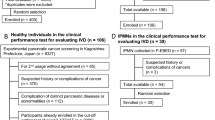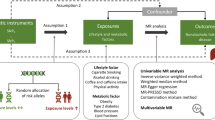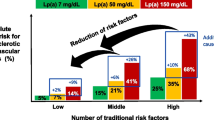Abstract
Purpose
Abnormalities in lipid levels have been associated with colorectal neoplasm risk; however, few studies have adjusted for use of cholesterol-lowering medications. The objective of this study was to determine the association of plasma lipid levels with adenoma risk while accounting for statin medication use.
Methods
We included 254 subjects with advanced adenoma, 246 with single small adenoma, 179 with multiple small adenoma cases, and 403 control participants in the Tennessee Colorectal Polyp Study who also had plasma lipid measurements performed. Data on the use of statin medications were available for 83.4 % of these participants. The association between plasma lipids and adenoma risk was evaluated using logistic regression models.
Results
Participants in the highest quartile of HDL cholesterol (range 52–106 mg/dl) had an adjusted odds ratio of 0.49 (95 % CI 0.23, 1.07), 0.35 (95 % CI 0.13, 0.91), and 0.22 (95 % CI 0.09, 0.54) for single small, multiple small, and advanced adenomas compared to the lowest quartile (range 12–34 mg/dl), respectively. Participants with the highest quartile of triglyceride levels (range 178–721 mg/dl) had an adjusted odds ratio of 2.40 (95 % CI 1.26, 4.55), 1.67 (95 % CI 0.66, 4.23), and 2.79 (95 % CI 1.25, 6.23) for single small, multiple small, and advanced adenoma, respectively, compared to the lowest quartile (range 40–84 mg/dl). When restricted to individuals with known statin medication use, adjusting for statin use did not appreciably affect these results.
Conclusion
We found a direct association between triglyceride plasma levels and an inverse association between plasma HDL cholesterol levels and adenoma risk. Both effects were not appreciably changed when accounting for the regular use of statin medication.
Similar content being viewed by others
References
Wu L, Yu C, Jiang H, Tang J, Huang HL, Gao J, Zhang X (2013) Diabetes mellitus and the occurrence of colorectal cancer: an updated meta-analysis of cohort studies. Diabetes Technol Ther 15(5):419–427. doi:10.1089/dia.2012.0263
Esposito K, Chiodini P, Colao A, Lenzi A, Giugliano D (2012) Metabolic syndrome and risk of cancer: a systematic review and meta-analysis. Diabetes Care 35(11):2402–2411. doi:10.2337/dc12-0336
Nikolic D, Katsiki N, Montalto G, Isenovic ER, Mikhailidis DP, Rizzo M (2013) Lipoprotein subfractions in metabolic syndrome and obesity: clinical significance and therapeutic approaches. Nutrients 5(3):928–948. doi:10.3390/nu5030928
Bird CL, Ingles SA, Frankl HD, Lee ER, Longnecker MP, Haile RW (1996) Serum lipids and adenomas of the left colon and rectum. Cancer Epidemiol Biomarkers Prev 5(8):607–612
Kim BC, Shin A, Hong CW, Sohn DK, Han KS, Ryu KH, Park BJ, Nam JH, Park JW, Chang HJ, Choi HS, Kim J, Oh JH (2012) Association of colorectal adenoma with components of metabolic syndrome. Cancer Causes Control 23(5):727–735. doi:10.1007/s10552-012-9942-9
van Duijnhoven FJ, Bueno-De-Mesquita HB, Calligaro M, Jenab M, Pischon T, Jansen EH, Frohlich J, Ayyobi A, Overvad K, Toft-Petersen AP, Tjonneland A, Hansen L, Boutron-Ruault MC, Clavel-Chapelon F, Cottet V, Palli D, Tagliabue G, Panico S, Tumino R, Vineis P, Kaaks R, Teucher B, Boeing H, Drogan D, Trichopoulou A, Lagiou P, Dilis V, Peeters PH, Siersema PD, Rodriguez L, Gonzalez CA, Molina-Montes E, Dorronsoro M, Tormo MJ, Barricarte A, Palmqvist R, Hallmans G, Khaw KT, Tsilidis KK, Crowe FL, Chajes V, Fedirko V, Rinaldi S, Norat T, Riboli E (2011) Blood lipid and lipoprotein concentrations and colorectal cancer risk in the European prospective investigation into cancer and nutrition. Gut 60(8):1094–1102. doi:10.1136/gut.2010.225011
Yang MH, Rampal S, Sung J, Choi YH, Son HJ, Lee JH, Kim YH, Chang DK, Rhee PL, Kim JJ, Rhee JC, Chun HK, Guallar E, Cho J (2013) The association of serum lipids with colorectal adenomas. Am J Gastroenterol 108(5):833–841. doi:10.1038/ajg.2013.64
Kim JH, Lim YJ, Kim YH, Sung IK, Shim SG, Oh SO, Park SS, Yang S, Son HJ, Rhee PL, Kim JJ, Rhee JC, Choi YH (2007) Is metabolic syndrome a risk factor for colorectal adenoma? Cancer Epidemiol Biomarkers Prev 16(8):1543–1546. doi:10.1158/1055-9965.EPI-07-0199
Ahmed RL, Schmitz KH, Anderson KE, Rosamond WD, Folsom AR (2006) The metabolic syndrome and risk of incident colorectal cancer. Cancer 107(1):28–36. doi:10.1002/cncr.21950
Park SK, Joo JS, Kim DH, Kim YE, Kang D, Yoo KY (2000) Association of serum lipids and glucose with the risk of colorectal adenomatous polyp in men: a case–control study in Korea. J Korean Med Sci 15(6):690–695
Bayerdorffer E, Mannes GA, Richter WO, Ochsenkuhn T, Seeholzer G, Kopcke W, Wiebecke B, Paumgartner G (1993) Decreased high-density lipoprotein cholesterol and increased low-density cholesterol levels in patients with colorectal adenomas. Ann Intern Med 118(7):481–487
Lee GE, Park HS, Yun KE, Jun SH, Kim HK, Cho SI, Kim JH (2008) Association between BMI and metabolic syndrome and adenomatous colonic polyps in Korean men. Obesity (Silver Spring) 16(6):1434–1439. doi:10.1038/oby.2008.216
Otani T, Iwasaki M, Ikeda S, Kozu T, Saito H, Mutoh M, Wakabayashi K, Tsugane S (2006) Serum triglycerides and colorectal adenoma in a case–control study among cancer screening examinees (Japan). Cancer Causes Control 17(10):1245–1252. doi:10.1007/s10552-006-0065-z
Liu CS, Hsu HS, Li CI, Jan CI, Li TC, Lin WY, Lin T, Chen YC, Lee CC, Lin CC (2010) Central obesity and atherogenic dyslipidemia in metabolic syndrome are associated with increased risk for colorectal adenoma in a Chinese population. BMC Gastroenterol 10:51. doi:10.1186/1471-230X-10-51
Gaard M, Tretli S, Urdal P (1997) Blood lipid and lipoprotein levels and the risk of cancer of the colon and rectum. A prospective study of 62,173 Norwegian men and women. Scand J Gastroenterol 32(2):162–168
Poynter JN, Gruber SB, Higgins PD, Almog R, Bonner JD, Rennert HS, Low M, Greenson JK, Rennert G (2005) Statins and the risk of colorectal cancer. N Engl J Med 352(21):2184–2192. doi:10.1056/NEJMoa043792
McKeown-Eyssen G (1994) Epidemiology of colorectal cancer revisited: are serum triglycerides and/or plasma glucose associated with risk? Cancer Epidemiol Biomarkers Prev 3(8):687–695
Giovannucci E (2007) Metabolic syndrome, hyperinsulinemia, and colon cancer: a review. Am J Clin Nutr 86(3):s836–s842
Cowey S, Hardy RW (2006) The metabolic syndrome: a high-risk state for cancer? Am J Pathol 169(5):1505–1522. doi:10.2353/ajpath.2006.051090
Kim YJ, Kim EH, Hahm KB (2012) Oxidative stress in inflammation-based gastrointestinal tract diseases: challenges and opportunities. J Gastroenterol Hepatol 27(6):1004–1010. doi:10.1111/j.1440-1746.2012.07108.x
Barrasa JI, Olmo N, Lizarbe MA, Turnay J (2013) Bile acids in the colon, from healthy to cytotoxic molecules. Toxicol In Vitro 27(2):964–977. doi:10.1016/j.tiv.2012.12.020
Schwartz CC, Halloran LG, Vlahcevic ZR, Gregory DH, Swell L (1978) Preferential utilization of free cholesterol from high-density lipoproteins for biliary cholesterol secretion in man. Science 200(4337):62–64
Robins SJ, Fasulo JM (1997) High density lipoproteins, but not other lipoproteins, provide a vehicle for sterol transport to bile. J Clin Invest 99(3):380–384. doi:10.1172/JCI119170
Shrubsole MJ, Wu H, Ness RM, Shyr Y, Smalley WE, Zheng W (2008) Alcohol drinking, cigarette smoking, and risk of colorectal adenomatous and hyperplastic polyps. Am J Epidemiol 167(9):1050–1058. doi:10.1093/aje/kwm400
Shrubsole MJ, Cai Q, Wen W, Milne G, Smalley WE, Chen Z, Ness RM, Zheng W (2012) Urinary prostaglandin E2 metabolite and risk for colorectal adenoma. Cancer Prev Res (Phila) 5(2):336–342. doi:10.1158/1940-6207.CAPR-11-0426
Buchowski MS, Schlundt DG, Hargreaves MK, Hankin JH, Signorello LB, Blot WJ (2003) Development of a culturally sensitive food frequency questionnaire for use in the Southern Community Cohort Study. Cell Mol Biol (Noisy-le-grand) 49(8):1295–1304
Friedewald WT, Levy RI, Fredrickson DS (1972) Estimation of the concentration of low-density lipoprotein cholesterol in plasma, without use of the preparative ultracentrifuge. Clin Chem 18(6):499–502
Westerterp M, Bochem AE, Yvan-Charvet L, Murphy AJ, Wang N, Tall AR (2014) ATP-binding cassette transporters, atherosclerosis, and inflammation. Circ Res 114(1):157–170. doi:10.1161/CIRCRESAHA.114.300738
Robinson JG (2010) Low high-density lipoprotein cholesterol and chronic disease risk marker or causal? J Am Coll Cardiol 55(25):2855–2857. doi:10.1016/j.jacc.2010.01.053
Yamamoto S, Yancey PG, Ikizler TA, Jerome WG, Kaseda R, Cox B, Bian A, Shintani A, Fogo AB, Linton MF, Fazio S, Kon V (2012) Dysfunctional high-density lipoprotein in patients on chronic hemodialysis. J Am Coll Cardiol 60(23):2372–2379. doi:10.1016/j.jacc.2012.09.013
Wu MY, Chang TC, Chao TY, Huang MT, Lin HW (2013) Risk of colorectal cancer in chronic kidney disease: a matched cohort study based on administrative data. Ann Surg Oncol 20(12):3885–3891. doi:10.1245/s10434-013-3065-8
Jafri H, Alsheikh-Ali AA, Karas RH (2010) Baseline and on-treatment high-density lipoprotein cholesterol and the risk of cancer in randomized controlled trials of lipid-altering therapy. J Am Coll Cardiol 55(25):2846–2854. doi:10.1016/j.jacc.2009.12.069
Ye X, Fu J, Yang Y, Chen S (2013) Dose-risk and duration-risk relationships between aspirin and colorectal cancer: a meta-analysis of published cohort studies. PLoS ONE 8(2):e57578. doi:10.1371/journal.pone.0057578
Acknowledgments
We thank Regina Courtney and Jie Wu for their excellent laboratory assistant, and Kimberly Campbell for lipid assays. This study was supported through the National Institute of Health Grants P50CA 95103, R01CA97386, R01CA143288, and R01HL106845. Surveys and sample collection, processing, and preparation for this study were conducted by the Survey and Biospecimen Shared Resource, which is supported in part by P30CA068485. The content of this paper is solely the responsibility of the authors and does not necessarily represent the official views of the National Cancer Institute or the National Institutes of Health. A portion of this material is the result of work supported with resources and the use of facilities at the VA Tennessee Valley Healthcare System.
Conflict of interest
The authors declare that they have no conflict of interest.
Author information
Authors and Affiliations
Corresponding author
Rights and permissions
About this article
Cite this article
Coppola, JA., Shrubsole, M.J., Cai, Q. et al. Plasma lipid levels and colorectal adenoma risk. Cancer Causes Control 26, 635–643 (2015). https://doi.org/10.1007/s10552-015-0555-y
Received:
Accepted:
Published:
Issue Date:
DOI: https://doi.org/10.1007/s10552-015-0555-y




